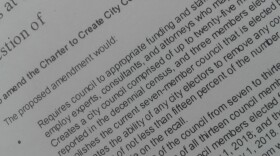
Columbus' Smart City Challenge grant victory was the topic at Wednesday's Columbus Metropolitan Club forum. Mike Foley reports.
In June, the City of Columbus won a $40 million-dollar U.S. Department of Transportation grant as part of the Smart Cities Challenge. More than 70 cities submitted applications. Columbus Public Service deputy director and Smart Columbus program manager Aparna Dial says the grant will help Columbus define and deploy futuristic, innovative technologies. Dial envisions Columbus as the epicenter for intelligent transportation systems while also improving neighborhoods lacking technology like Linden.
“So a lot of the coaxial infrastructure in the neighborhood is lacking and cannot be upgraded, so the Wi-Fi access in spotty. Let’s start with smart street lights with LED motion sensor technology so it’s more walkable, increases safety and we are going to put Wi-Fi infrastructure so residents can have free internet access. The other thing is to put up neighborhood hubs, which will have information about transportation options. We’re going to extend bike share and car share options, but one of the most exciting things is that we’re going to have kiosks where you can take cash and convert it to a smart payment card that they can use to pay for all options.”
Dial says she hopes the smart payment card will also be an option in grocery stores. Also in the grant package, $10 million from Seattle-based Vulcan Incorporated. Columbus Partnership president and CEO Alex Fischer says those funds have a specific purpose.
“That $10 million is all around the electrification economy and much of the research that we’ve committed to at Ohio State and American Electric Power as well as programs in the private sector, are very specifically geared to the electrification goals. We’re not ready to unveil them right now, but we’re talking about programs with dealers in Columbus, electric charging stations, adoption strategies with our employers, CEO commitments to drive electric vehicles, employee programs inside our companies to incentivize electric vehicles. We’re behind right now as a city as it relates to electrification adoption and use, and this grant very specifically is going to jumpstart a whole host of activities and series. I’ll give you a simple example – if you go to the Tesla website and click ‘give me the certified electrician that can install a charging station,’ one doesn’t exist in Ohio.”
The city also raised another $90 million through public and private partnerships. While there are admittedly limited specifics, Fischer urges patience as the city embarks on a four-year- process.
“Tomorrow, we’re not going to have a bunch of autonomous vehicles running around Columbus. Actually, autonomous vehicles don’t work very well in the snow. You will see some autonomous tests likely at Easton, likely on the Ohio State campus, small bus-like transit vehicles that are moving people around. But more importantly what you’re gonna see is us in the conversation of what the vehicle of the future is going to look like.”
Fischer anticipates this fall as the final engineering phase with more specifics and project timelines by March.










